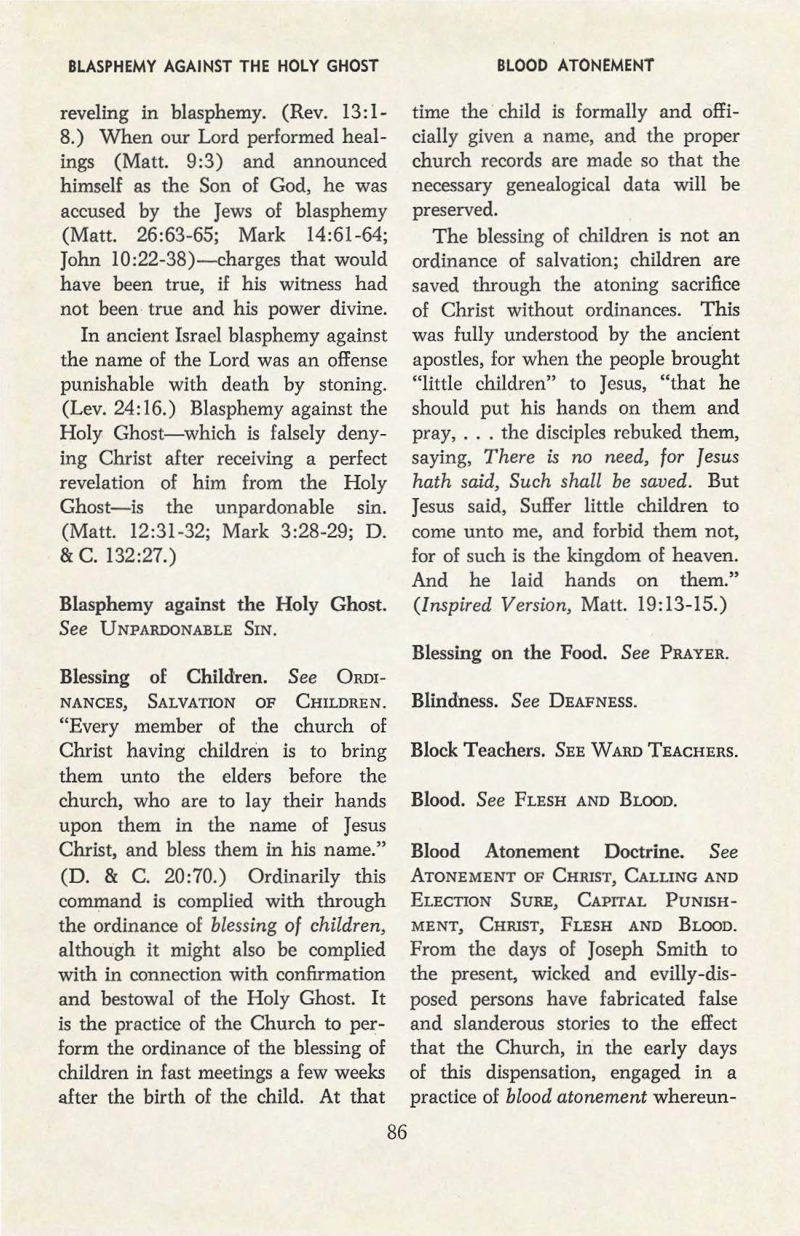McConkie teaches the doctrine of blood atonement.
- Type
- Book
- Hearsay
- Direct
- Reference
Bruce R. McConkie, "Blood Atonement Doctrine" in Mormon Doctrine (Salt Lake City: Bookcraft, 1958), 86-88
- Scribe/Publisher
- Bookcraft
- Audience
- Reading Public
- Transcription
From the days of Joseph Smith to the present, wicked and evilly-disposed persons have fabricated false and slanderous stories to the effect that the Church, in the early days of this dispensation, engaged in a practice of blood atonement whereunder the blood of apostates and others was shed by the Church as an atonement for their sins. These claims are false and were known by their originators to be false. There is not one historical instance of so-called blood atonement in this dispensation, nor has there been one event or occurrence whatever, of any nature, from which the slightest inference arises that any such practice either existed or was taught.
There are, however, in the sermons of some of the early church leaders some statements about the true doctrine of blood atonement and of its practice in past dispensations, for instance, in the days of Moses. By taking one sentence on one page and another from a succeeding page and even by taking a part of a sentence on one page and a part of another found several pages away—all wholly torn from context—dishonest persons have attempted to make it appear that Brigham Young and others taught things just the opposite of what they really believed and taught.
Raising the curtain of truth on this false and slanderous bluster of enemies of the Church who have thus wilfully chosen to fight the truth with outright lies of the basest sort, the true doctrine of blood atonement is simply this:
1. Jesus Christ worked out the infinite and eternal atonement by the shedding of his own blood. He came into · the world for the purpose . of dying on the cross for the sins of the world. By virtue of that atoning sacrifice immortality came as a free gift to all men, and all who would believe and obey his laws would in addition be cleansed from sin through his blood. (Mosiah 3:16-19; 3 Ne. 27:19- 21; 1 John 1:7; Rev. 5:9-10.)
2. But under certain circumstances there are some serious sins for which the cleansing of Christ does not operate, and the law of God is that men must then have their own blood shed to atone for their sins. Murder, for instance, is one of these sins; hence we find the Lord commanding capital punishment. Thus, also, if a person has so progressed in righteousness that his calling and election has been made sure, if he has come to that position where he knows "by revelation and the spirit of prophecy, through the power of the Holy Priesthood" that he is sealed up unto eternal life (D. & C. 131:5), then if he gains forgiveness for certain grievous sins, he must "be destroyed in the flesh," and "delivered unto the buffetings of Satan unto the day of redemption, saith the Lord God." (D. & C. 132:19-27.)
President Joseph Fielding Smith has written: "Man may commit certain grievous sins—according to his light and knowledge—that will place him beyond the reach of the atoning blood of Christ. If then he would be saved, he must make sacrifice of his own life to atone—so far as his power lies—for that sin, for the blood of Christ alone under certain circumstances will not avail. . . . Joseph Smith taught that there were certain sins so grievous that man may commit, that they will place the transgressors beyond the power of the atonement of Christ. If these offenses are committed, then the blood of Christ will not cleanse them from their sins even though they repent. Therefore their only hope is to have their own blood shed to atone, as far as possible, in their behalf." (Doctrines of Salvation, vol. 1, pp. 133-138.)
This doctrine can only be practiced in its fulness in a day when the civil and ecclesiastical laws are administered in the same hands. It was, for instance, practiced in the days of Moses, but it was not and could not be practiced in this dispensation, except that persons who understood its provisions could and did use their influence to get a form of capital punishment written into the laws of the various states of the union so that the blood of murderers could be shed.
- Citations in Mormonr Qnas
The B. H. Roberts Foundation is not owned by, operated by, or affiliated with the Church of Jesus Christ of Latter-day Saints.

